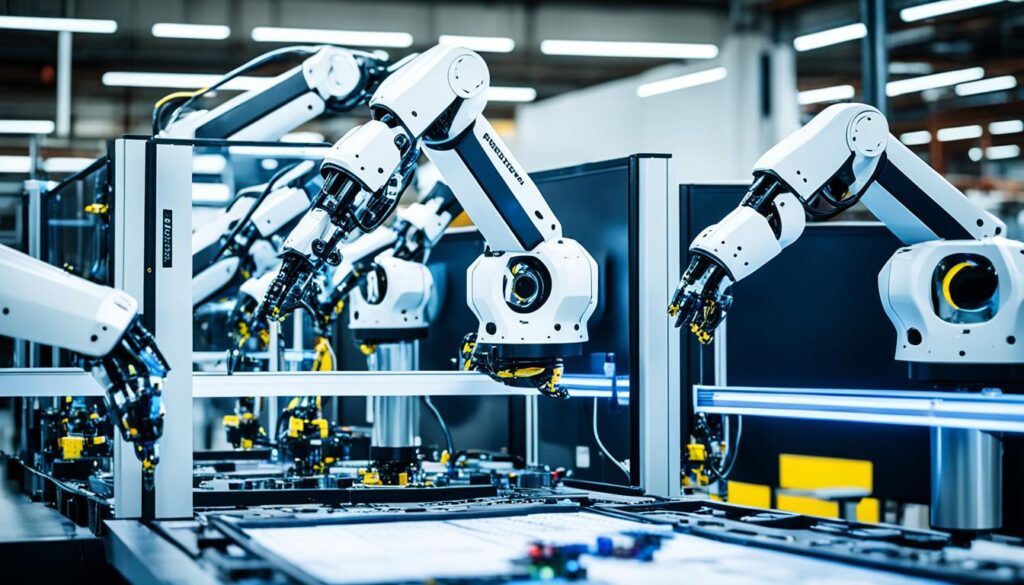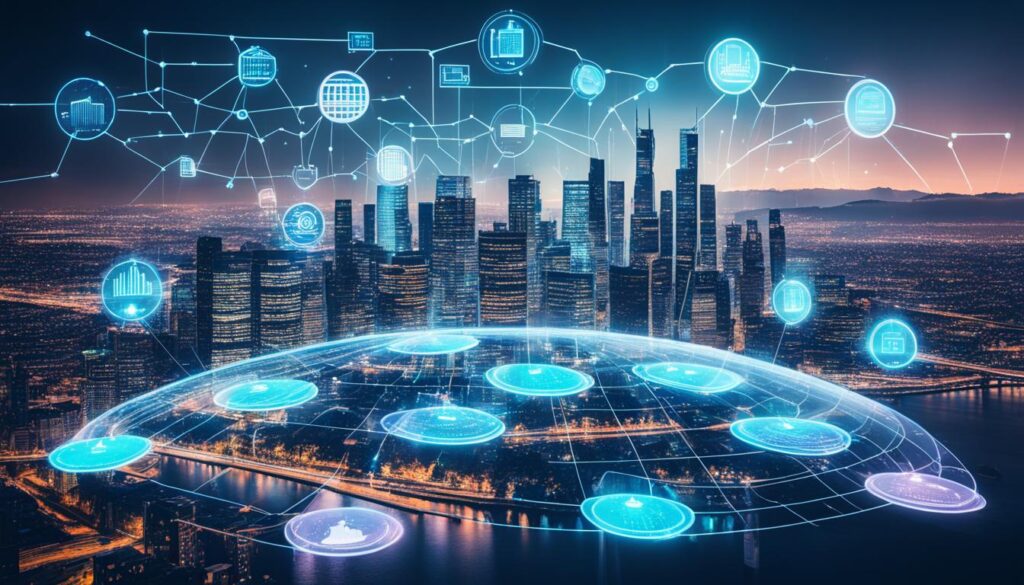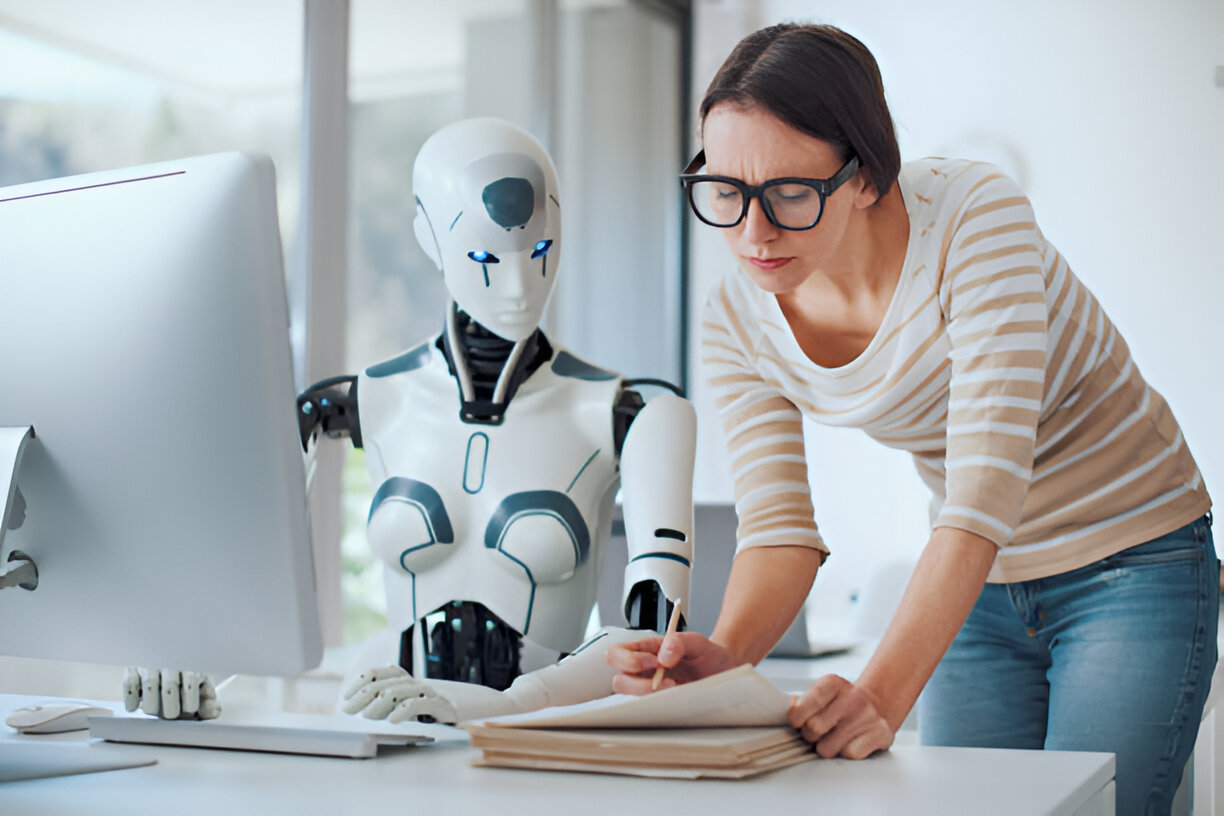Artificial intelligence (AI) has been around for a while, but ChatGPT made it popular last November. This excitement and worry are both understandable. ChatGPT quickly reached 100 million users, making it one of the fastest-growing online services. Its ability to write like a human, answer questions, and more has made people wonder, could it replace our jobs?
Businesses should not fear AI without seeing what it can do. Trying out AI is a smart move for leaders. It helps them understand the tech’s strengths and weaknesses.
Key Takeaways
- AI-powered tools like ChatGPT are changing industries and shaking up old business models.
- Companies that use AI can automate tasks, increase productivity, and make smarter decisions.
- AI is making customer experiences better and more personal, leading to more sales and loyalty.
- Adding AI to operations can cut costs and make companies more efficient.
- Using AI responsibly means dealing with ethical issues and protecting data privacy.
Automated Processes: AI-Driven Efficiency
The business world is moving fast towards automation, and AI-powered automation is leading the charge. It’s changing how companies work by making tasks less repetitive and more efficient. This shift is thanks to AI and the future of work, which brings ai-driven efficiency to the forefront.
Streamlining Operations with AI
AI is a big deal in the workplace for automating tasks that used to take up a lot of time. It can handle huge amounts of data quickly, making fewer mistakes. This means employees can focus on big-picture tasks instead of the small stuff. For example, AI can make repetitive tasks more efficient, cutting down on mistakes and costs.
Natural Language Processing (NLP) is another AI tool that changes how companies welcome new employees. It lets machines understand and respond to human language. This means new hires get all the paperwork and info they need automatically, making their start smoother.
AI in HR and Onboarding
AI-powered automation in workplaces has changed HR for the better. It helps with hiring and onboarding, making things faster and better for everyone. AI uses smart analytics and language skills to help pick candidates, set up interviews, and make onboarding personal.
Take System4u, an IT company, for example. They cut down the time it takes to assign tasks by 85%, from 35 minutes to just 5. They also reduced their ticket backlog by 30% and improved response times by 50%, all thanks to AI.
As companies keep using AI-driven efficiency, the future of work looks set to change. We’ll see operations running smoother, less paperwork for everyone, and happier employees.

AI-Powered Decision Making
Artificial intelligence (AI) is changing how businesses make decisions. It brings data-driven insights and strategic foresight. With AI’s growing use, companies are automating tasks, finding hidden patterns, and making their decisions more accurate and objective.
Data-Driven Insights
AI uses vast amounts of data to give businesses a deeper look into their operations and customer needs. Through machine learning, AI spots complex patterns that are hard for humans to see. This helps businesses make smarter, strategic choices that lead to growth and an edge over competitors.
Predictive Analytics for Strategic Planning
AI can analyze past data and predict future trends, helping businesses plan better. It can see market changes, customer habits, and what resources will be needed. This lets companies adjust their strategies quickly and stay ahead in a fast-changing world.
Using AI to make decisions is also making businesses run smoother and improve customer experiences. AI analyzes data in real-time to offer personalized services, make processes faster, and guess what customers need. This leads to happier customers and more loyalty.
As more companies use AI, over 50% now spend more than 5% of their digital budgets on it, the future of decision-making is changing. By using data and predictive analytics, businesses can get a big edge, run better, and stay ahead in a complex world.

“AI is not just a technology, but a strategic imperative for businesses to stay competitive and adaptable in today’s fast-paced, data-driven world.”
Enhancing Customer Experience with AI
Artificial intelligence (AI) is changing how businesses talk to their customers. It uses advanced analytics to make customer interactions more personal. This means customers get things they like and need, based on their actions.
AI chatbots are a big deal in customer service now. They can solve problems before they start. 62% of consumers prefer AI chatbots for quick help instead of waiting for a person. These chatbots use smart learning and natural language to talk like humans, giving customers what they need.
AI does more than just chat with customers. Barilliance found that personalized product recommendations can boost sales by up to 31%. By looking at what customers buy and like, AI can suggest products that fit their style. This leads to more sales and happier customers.
For instance, Amazon uses AI to suggest products based on what you like. Starbucks uses AI too, to send personalized messages and manage stock, making customers more loyal.
AI also helps in other areas, not just online shopping. Sephora’s Virtual Artist App uses AI and AR to let customers try makeup virtually. This helps customers make better choices and builds trust with the brand.
As AI gets better, it will keep making customer experiences better. By using smart analytics and talking to customers proactively, businesses can make customers happier and more loyal. The future of making customers happy is all about AI, and smart companies are already using it.

| Key Statistic | Insight |
|---|---|
| 60% of consumers are more likely to make a repeat purchase after a personalized shopping experience. | Personalization is a key driver of customer loyalty and repeat business. |
| Personalized product recommendations can contribute up to 31% of e-commerce site revenue. | AI-powered personalization can significantly boost sales and revenue. |
| 62% of consumers prefer immediate assistance from AI-powered chatbots. | AI-powered chatbots are increasingly preferred over human agents for customer service. |
| When issues are resolved quickly, customers are 2.4 times more likely to remain loyal. | Efficient issue resolution is crucial for maintaining customer loyalty. |
The future of making customers happy is all about AI. Businesses are using it to predict what customers want, understand their feelings, and talk to them in a way that keeps them coming back.
How will AI Affect Business in the Future
The future of business is changing fast, thanks to AI. Experts say AI will change many industries. It will make businesses work better, save money, and improve how they talk to customers.
Boosting Productivity and Cost Savings
AI is set to change business processes a lot by 2024. It could cut costs by 37% for businesses that year. Companies using AI will likely have more market share and work 10 times more efficiently than others.
AI will automate boring tasks and help make better decisions. This will change how businesses work, leading to more productivity and savings.
AI in Customer Service and Personalization
AI will also change how customers are treated, with predictions that it will handle 85% of business customer relationships by 2024. AI chatbots and virtual assistants will offer personalized support all the time. They will understand what customers need and talk to them in a way that feels personal.
This technology is making customers happier and helping businesses run smoother. It lets companies give great service to more people at once.
As AI becomes more popular, businesses that use it will do well. They can use AI to make things run better, save money, and give customers a better experience. This will help them stay ahead in a digital world.
“AI innovations will be comparable to the industrial revolution, reshaping the way we live and work.”
| AI Benefits | Percentage of Businesses Adopting |
|---|---|
| Improved Customer Engagement | 63% |
| Enhanced Data Analysis | 62% |
| Automated Processes | 57% |
| Strategic Recommendations | 49% |
| Improved Decision Making | 44% |
Transforming Business Operations
Artificial intelligence (AI) is changing how businesses work. It brings new levels of efficiency, flexibility, and smart decision-making. With the AI market set to hit over $500 billion by 2024, companies are quickly adding AI technologies like machine learning and deep learning to their core.
AI and Supply Chain Management
AI is making a big difference in supply chain management. It can predict and manage weather issues, market shifts, and logistical problems with great accuracy. This helps businesses quickly adjust and keep operations smooth. AI and supply chain management work together well, making shipping routes better, predicting demand, and automating inventory, which boosts supply chain efficiency.
Maersk, a leading shipper, uses AI to find the best shipping routes and ensure goods arrive on time. Airbus uses AI to predict when equipment might fail, keeping planes flying smoothly and reducing downtime.
“AI is revolutionizing business intelligence by enabling the analysis of vast databases and identifying key trends, patterns, and irregularities to enhance profitability.”
AI is not just for supply chains. It’s also boosting productivity, cutting down on mistakes, and raising quality in many business areas. Retailers use AI to study customer buying habits and fine-tune sales plans. Banks and government agencies use AI to fight financial and data fraud.
As AI automation keeps making business processes better, companies will see big gains in efficiency, cost cuts, and competitiveness. The use of AI and supply chain management, along with other key business areas, will be crucial for success in the future.
AI in Talent Acquisition and Management
AI is changing more than just how we work or talk to customers. It’s also changing how we find and manage people. With advanced algorithms, finding the right candidate is faster and more accurate. They look at skills, experience, and fit with the company culture.
AI also helps top leaders make better decisions about their teams. It predicts which skills will be needed and helps keep the best people. As AI in talent acquisition and management grows, companies are entering a new era of smarter, more efficient hiring and talent growth.
Streamlining the Hiring Process with AI
AI’s impact on hiring is clear. This year, AI references on earnings calls have surged 366%. This shows how important AI is becoming in finding new talent. 61% of Americans don’t know employers use AI in hiring, showing how fast these tools are being adopted.
Big names like Google and LinkedIn use AI to improve hiring. Google uses AI to screen resumes and find the right candidates. LinkedIn uses AI to suggest jobs to people and companies. Amdocs says AI is used at every stage of recruitment.
Using AI in hiring has big benefits. 63% of U.S. talent acquisition professionals say AI has changed hiring. AI use in HR has jumped three times in a year. The AI recruitment market is set to hit $388.7 million by 2027, showing its huge potential.
Mitigating Bias and Enhancing the Candidate Experience
AI helps reduce bias in hiring, making it fairer for everyone. 78% of recruiters think AI makes hiring more efficient. AI can check thousands of resumes in seconds, saving HR a lot of time.
86% of job seekers think AI can make job searching better. Companies using AI for hiring spend 35% less. AI tools quickly analyze resumes, finding the right skills and experiences in minutes. This used to take weeks for humans.
But, AI in hiring has challenges too. AI can sometimes keep biases, leading to unfair hiring. It’s important to make sure AI tools don’t discriminate by gender, race, or other protected traits.
As AI in talent acquisition and management keeps evolving, finding the right balance is key. We need AI to be efficient and fair, while also keeping the human touch that candidates value.
| Key Statistic | Significance |
|---|---|
| AI references on earnings calls have surged 366% this year | Indicates the growing importance of AI in the recruitment landscape |
| 61% of Americans are unaware that employers are currently using AI in hiring | Highlights the rapid adoption of AI-powered tools in talent acquisition |
| 63% of U.S. talent acquisition professionals say AI has changed the way recruiting is done | Demonstrates the transformative impact of AI on recruitment practices |
| The global AI recruitment market is expected to reach $388.7 million by 2027 | Underscores the immense potential and growth of AI in talent acquisition |
| 78% of recruiters believe AI can make their hiring process more efficient | Highlights the perceived benefits of AI in streamlining recruitment processes |
| 86% of job seekers believe AI could help improve their job search experience | Suggests that candidates are open to the integration of AI in the hiring process |
| Companies using AI in recruiting have reported a 35% decrease in hiring costs | Demonstrates the cost-saving potential of AI-powered talent acquisition |
“AI should complement, not replace, human interaction, maintaining an empathetic touch throughout the recruitment process.”
AI-Driven Business Intelligence
The future of business intelligence is changing fast, thanks to artificial intelligence (AI). This change brings quick, useful information to businesses. It helps them make smart choices, lower risks, and find new opportunities in the market. AI is changing how businesses make decisions, bringing a new level of accuracy and foresight to planning.
Mastering Data Complexity
AI is changing how companies use data with business intelligence (BI). It automates data processing and analysis. This means AI finds patterns and trends that were hard to see before. AI in BI automates data processing, revealing insights that might be hidden, unlike traditional BI which relies on manual analysis.
AI also makes data easy for non-tech people to use, making data access open to everyone. This means businesses can make better decisions with data, not just a few experts. It helps them stay ahead in their fields.
AI makes BI better by analyzing different types of data, predicting trends, and making decisions ahead of time. It gives real-time insights and forecasts. It also lets users interact with data using natural language, making it easier to understand.
| AI-Driven BI vs. Traditional BI | Benefits |
|---|---|
| Automates data processing, reveals hidden insights | Improved efficiency, enhanced decision-making |
| Democratizes data access and analysis | Reduced dependency on specialized data teams |
| Offers structured and unstructured data analysis | Comprehensive, data-driven insights |
| Introduces predictive and prescriptive analysis | Proactive, forward-looking decision-making |
| Delivers real-time insights and forecasts | Timely, relevant information for agile responses |
| Enables dynamic interaction with natural language processing | Intuitive, user-friendly data exploration |
AI-driven business intelligence has changed many industries for the better. In retail, AI helps analyze customer data to spot trends. This helps with managing supply chains and setting prices. Machine learning in BI tools predicts what customers want, leading to personalized product suggestions and marketing.
As the business world changes, mastering data complexity with AI-driven BI will set companies apart. By using AI, businesses can make smarter decisions, stay ahead, and find new ways to grow and succeed.
“AI integration with business intelligence has transformed various industries, with real-world use cases showing significant benefits.”
Ethical Considerations and Governance
Businesses are now using artificial intelligence (AI) more often. This brings up important ethical and governance issues. AI acts like an extension of human thought. So, any biases or limits in the minds of those making the algorithms can get worse online. It’s crucial for businesses to think carefully about how humans and AI work together. They must be clear and responsible in their AI use.
Addressing Biases and Accountability
AI can have a big problem with algorithmic bias. Companies need to work hard to stop biases from showing up in their AI. This means looking at gender, racial, and socioeconomic biases that could lead to unfair decisions.
To tackle these issues, companies should set up strong rules for using AI. This includes AI ethics for businesses, like addressing biases and accountability. This could mean:
- Creating clear rules for making and using AI
- Checking AI regularly to find and fix biases
- Being open about how AI makes decisions
- Having humans check and sometimes override AI suggestions
- Training employees on AI ethics and the dangers of bias and discrimination
By dealing with these ethical issues, companies can use AI safely. This helps them stay fair, open, and responsible.
“Ethical AI is not just a buzzword, but a critical imperative for businesses to navigate the complexities of this transformative technology.”
As AI gets more common in business, the need for strong ethical rules will grow. By tackling biases and being accountable, companies can make the most of AI. This helps keep public trust and ensures their success in the long run.
Conclusion
Today, AI-fueled innovation is making businesses more efficient and productive. More companies are using AI to boost their operations. This shift is thanks to the spread of AI to various open AI models.
However, businesses must think about the ethical and governance issues that come with AI. The integration of AI technology is full of potential but also brings challenges.
As AI technology grows, business leaders must weigh its risks and benefits. This will help them stay ahead and grab the chances AI offers. The global AI market is expected to grow a lot, with a 38.1% annual growth rate from 2022 to 2030.
This shows how big the impact of AI-fueled innovation will be on companies. The future of business will be shaped by how AI is used wisely and responsibly. By tackling the complexities of AI, businesses can improve productivity, use data better, and give customers great experiences.
By embracing AI’s potential, companies can succeed in the fast-changing digital world.
FAQ
What are the key ways AI will affect business in the future?
AI will change many parts of business. It will automate tasks, improve decision-making, and make customers happier. It will also save time and money, change how we manage supply chains, and change how we find and manage talent.
How can AI help automate business processes?
AI can make work easier by automating tasks. It can handle things like onboarding new employees, send out paperwork, and guide them through their first steps. This frees up time for more important work.
How can AI support business decision-making?
AI looks at huge amounts of data to find patterns and insights. This helps companies make faster, smarter choices. It also helps spot areas where things can be improved.
How will AI enhance the customer experience?
AI-powered chatbots are already helping with customer service. They can now do more than just answer questions. They can also solve problems before customers even ask.
What are the productivity and cost-saving benefits of AI for businesses?
AI is expected to cut costs by 37% for businesses in 2024. Companies using AI will likely have more market share and be 10 times more efficient than those without it.
How can AI transform supply chain management?
AI can make supply chains more efficient and adaptable. It can predict and handle disruptions, market changes, and logistical issues with great accuracy. This helps businesses stay consistent and adapt quickly.
How can AI impact talent acquisition and management?
AI can quickly find the right candidates by looking at their skills, experience, and fit with the company. It can also help leaders make smart decisions about the workforce, improving skills, and keeping top talent.
What are the ethical considerations and governance challenges in adopting AI?
AI reflects human thought, so it can amplify biases or limitations in the people creating the algorithms. Companies must think carefully about the role of humans in AI, ensuring transparency and accountability.









